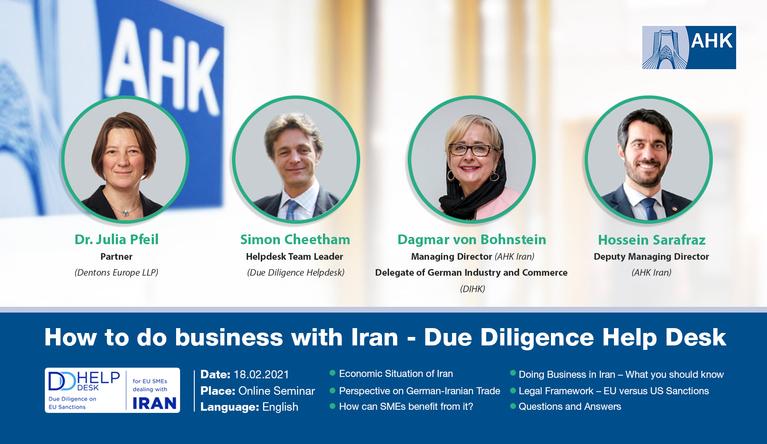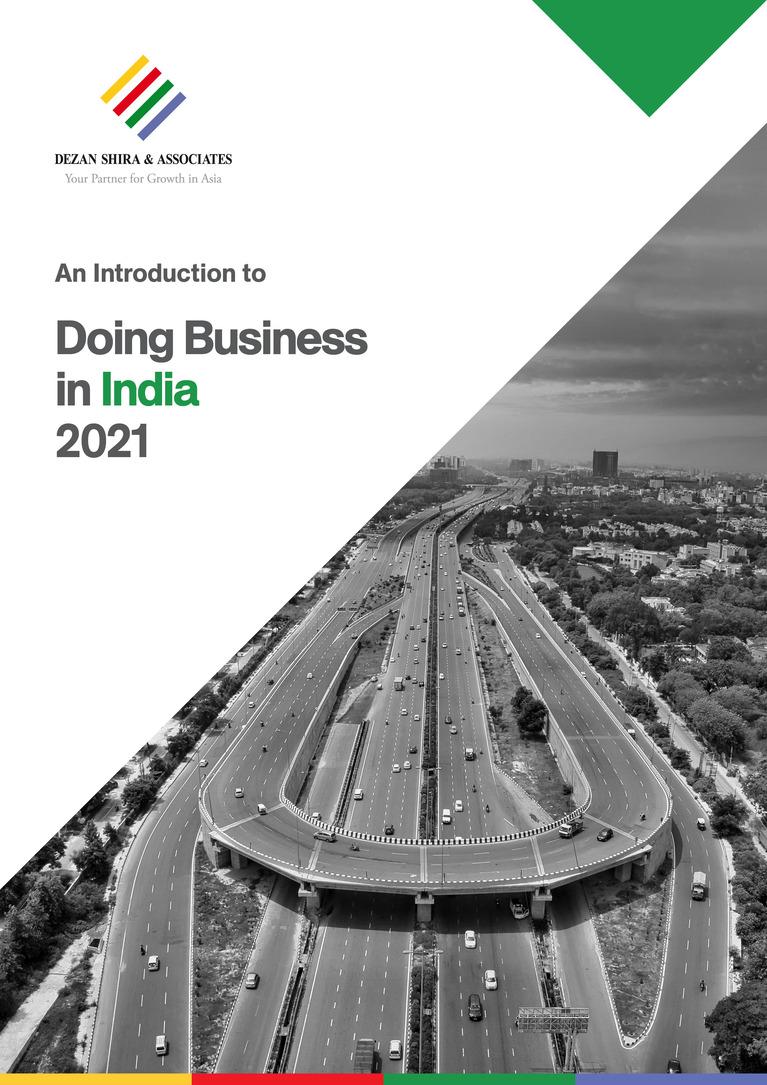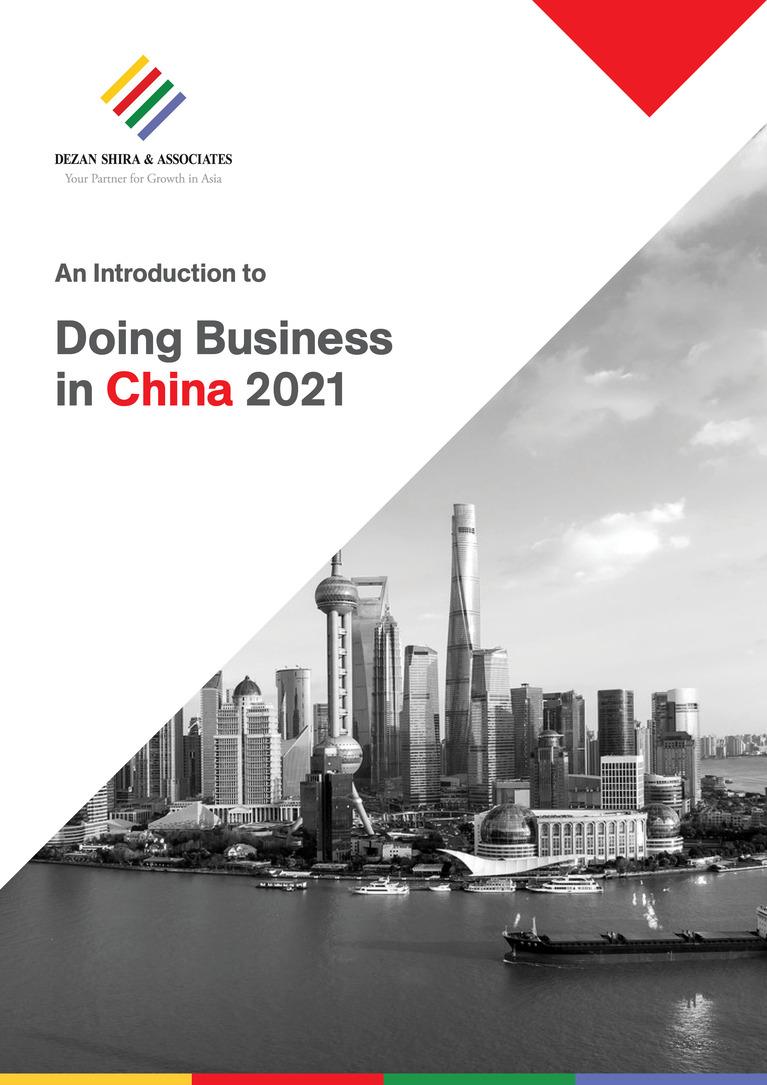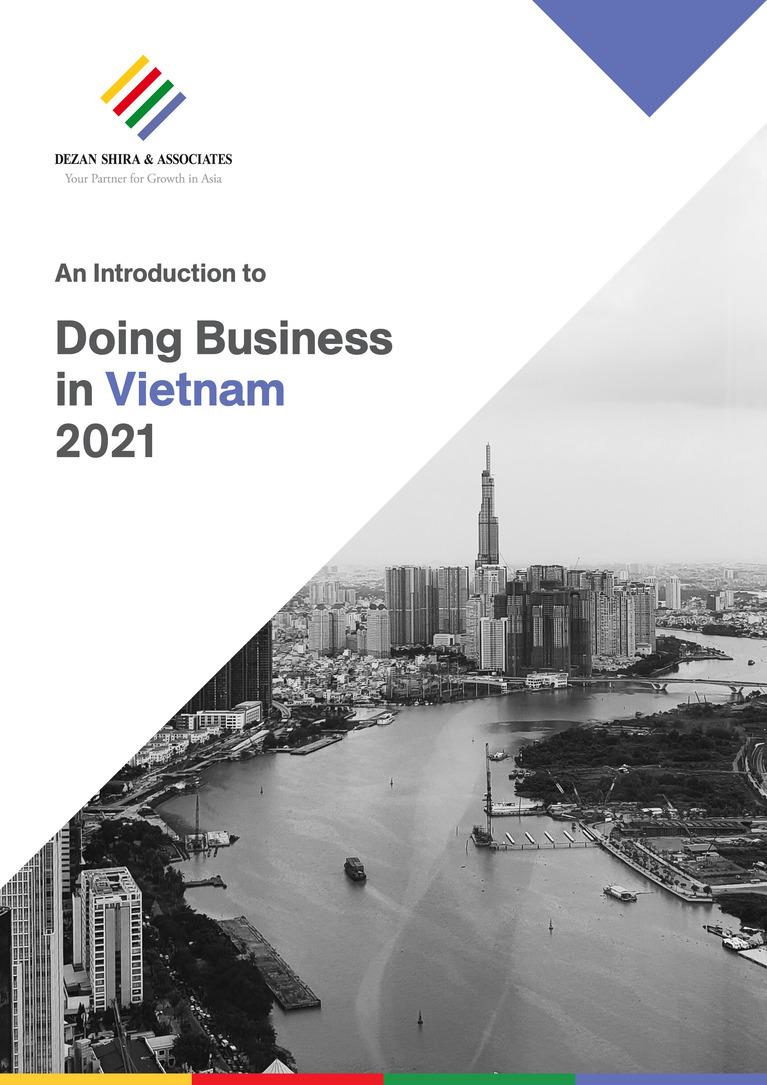BUSINESS OPPORTUNITIES AND HR TRENDS IN UAE

CT Executive Search Updates
On the 23rd of February IHK Karlsruhe held a webinar on the business opportunities and HR trends in UAE.
Moderated by Stanislav Fromm, Senior Consultant Foreign Trade, Foreign Trade and International Relations, the event began with an opening address from Robert W. Huber, Chairman, Foreign Trade Committee, IHK Karlsruhe.
Christian Tegethoff, Managing Director, CT Executive Search focused on the current HR trends, an overview of the labour market and recruitment of executives in the Gulf States.
IRAN: The trend is becoming increasingly positive

Dr. Alireza Azimzadeh, Founder, Persia Associates, Persia Consulting and Persia Financial
How do European companies currently operate in Iran?
For the past three years, companies have mainly waited and hoped that business could go on at some point.
We manage a large number of „sleeping“ subsidiaries in legal and accounting terms. The central point is the representation vis-à-vis the tax authorities. These corporate hulls can be reactivated at any time if the parent company wants to resume operations in Iran.
FIRST EMPLOYER TO KICK OUT VACCINATION REFUSERS

Are employers entitled to impose a corona vaccination?
Labour law sanctions in case of refusal of vaccination
Can employees who refuse vaccination be faced with sanctions under labour law? According to the press in recent days, there have already been the first terminations of employment.
Employers in China Should Prepare for Compliance Expectations Under Draft PIPL

The purpose and necessity of legislation for personal information protection is simple and straightforward, that is, it is our right as individuals to have our personal information and privacy protected, especially given the speedily developing electronic world with widely used networks. Yet, the laws protecting personal information are not simple for us to digest; you may agree with the complexity if you have reviewed or studied, for example, the General Data Protection Regulation (“GDPR”) of the European Union.
India’s New Industrial Relations Code and its Impact on Labor Law

The IR Code is one of four new labor codes introduced for the purpose of simplifying and consolidating the country’s matrix of labor laws, which in turn will make it easier to comply with for foreign investors and the private sector.
Altogether, the four codes look at introducing uniformity in rules and regulations relating to wages, industrial relations, social security, and occupational safety and health to be in line with international best practices.
Iran's HR Sector: Momentum can develop quickly

Christian Tegethoff, Managing Director, CT Executive Search
How does executive search in Iran differ from other countries?
Companies that want to invest in Iran are now in a better position to do so, from an HR perspective, than during the boom in 2016 and 2017. Back then, the HR market belonged to the candidates. Today, it is on the side of the employer.
Attracting and retaining motivated and highly qualified employees to executive positions is therefore relatively easy for foreign companies. However, the number of executives available in Iran who are qualified to work in an international company is relatively small.
Digital nomads will find their legal basis in Slovakia

Slovakia modernises ‘home office’ rules under Employment Law. Digital nomads, or the choice of any place of work in employment contract by employees, will become a reality.
The amendment to the Labor Code, which is already before the Slovak Parliament, will significantly modernise the legal institution of ‘home office’. Due to new modern trends, where the permanent presence of employees at the workplace is increasingly dispensed with, the conditions for home office work will be redefined. A home office will no longer be seen as just working from home, but rather employees will have a way to determine their own working hours and actual work location. Digital nomads who move around the world (without having a home) and working from anywhere will finally find their legal basis. In addition, the employer will have to share the costs of employees associated with a home office, such as BYOD costs, electricity costs, high-speed internet, and so on.
The outcome of the US election has clearly had a positive effect on the economy

Abbasali Ghassaei, President, German-Iranian Chamber of Commerce and Industry (AHK Iran)
How many German companies are represented in Iran today?
Membership in AHK Iran is growing steadily. Currently, we have over 2, 000 members. Despite the sanctions placed by the USA, since in 2018, the number of members has continued to increase. Iranian entrepreneurs are very interested in Germany. Currently, we have around 100 German member companies. Some of them have been members of AHK Iran for over thirty years. In Iran itself, the number of economically active German companies has decreased significantly due to the US sanctions and their effects on non-US companies.
Why Getting a Job in Russia Isn’t That Hard

Matt Shannon, Co-Founder, Expatriant
Are you looking for a job in Russia and wondering how difficult it will be to find one? The answer might surprise you. In fact, due to many factors, Russia is one of the easiest countries in the world to find a job as an expat. In 2020, US News & World Report ranked Russia the number one country in the world to start a career.
If you need encouragement to start your job search in Russia you have come to the right place, here are 3 great reasons why it isn’t that hard to find a job in Russia.
- Demand for Native English Speakers
- Easy Work Permit and Work Visa Regulations
- Low Level of Competition
AHK Iran Online Event: How to do business with Iran

The German-Iranian Chamber of Industry and Commerce (AHK Iran) and the Due Diligence Helpdesk (funded by the European Union)
The German-Iranian Chamber of Industry and Commerce (AHK Iran) and the Due Diligence Helpdesk (funded by the European Union) are holding the event "How to do business with Iran" on February 18, which will take place as an online conference.
DETAILS
Event Start: 18/02/2021 | 12:30 CET
Event End: 18/02/2021 | 14:00 CET
Price: Free
Registration: Register here
Regarding the economic relations between European and Iranian businesses, in this event the economic situation of Iran and the perspective of German-Iranian trade will be analyzed by AHK Iran’s managing director and the question "How can SMEs benefit?" will be answered by Helpdesk Team Leader.
If you are a European company or an Iranian with European trade relations, you will enjoy this event.
An Introduction to Doing Business in India 2021

Doing Business in India 2021 is designed to introduce the fundamentals of investing in India. Compiled by the professionals at Dezan Shira & Associates in January 2021, this comprehensive guide is ideal not only for businesses looking to enter the Indian market, but also for companies who already have a presence here and want to keep up to date with the most recent and relevant policy changes.
An Introduction to Doing Business in China 2021

Doing Business in China 2021 is designed to introduce the fundamentals of investing in China. Compiled by the professionals at Dezan Shira & Associates in January 2021, this comprehensive guide is ideal not only for businesses looking to enter the Chinese market, but also for companies who already have a presence here and want to keep up-to-date with the most recent and relevant policy changes.
Doing Business in China 2021 covers:
- Establishing and Running a Business
- Tax, Audit, and Accounting
- Human Resources and Payroll
An Introduction to Doing Business in Vietnam 2021

An Introduction to Doing Business in Vietnam 2021 will provide readers with an overview of the fundamentals of investing and conducting business in Vietnam.
2020 is a year, businesses are likely to forget due to the pandemic that disrupted global supply chains resulting in significant businesses losses. Nevertheless, Vietnam was one of the few countries that achieved net positive growth of 2.91 percent in 2020. This is one of the reasons why foreign investors remain keen on doing business in the country.
Vietnam Approves Labor Code for 2021

- Vietnam’s National Assembly approved a new Labor Code which took effect in January 2021.
- The amended code offers greater protection for employees and is viewed as better aligned with international best practices.
- The government released Decree 145 guiding the implementation of the labor code, which will take effect on February 1, 2021.
- Businesses should review their labor practices and ensure they are compliant as per amendments in the labor code.
Vietnam approved an amended Labor Code, which came into effect in January 2021. The amendment to the labor regulations are a step towards aligning with international labor standards particularly as Vietnam integrates into the world economy as noted by the International Labor Organization (ILO).
Poland: New year – important new changes in consumer protection and labour law

Poland: Some entrepreneurs are protected by consumer protection, the minimum wage is rising, and specific task contracts must be notified.
Entrepreneurs will be partly covered by consumer protection - with the new year, natural persons conducting business will in some cases be treated in the same way as consumers.
The food, beverage and tobacco manufacturing industry in Nigeria
africon did a market analysis for a European food ingredient manufacturing company interested in understanding the industry in Nigeria. The project aim was to understand potentials in various market segments and to ultimately determine scale and scope of opportunities...
Remote Work in 2021: Tips for HR Managers in India

Since the COVID-19 outbreak, a majority of Indian professionals have shown interest in opting for a more permanent remote work plan. Initially motivated by health and workplace safety concerns, now technology tools and flexible work arrangements have convinced many professionals about the positive aspects of working in an all-digital environment.
Going into 2021, with the status of the COVID-19 vaccine in India still unclear and roll-out likely to last the year, human resource managers must be better prepared to navigate extended remote work arrangements and increasing staff interest in continuing telecommuting even when the pandemic subsides.
Emirates are the most attractive location

Christian Tegethoff, Managing Director, CT Executive Search
What are the characteristics of the labour markets in the GCC region?
In many countries in the region there are significantly more expatriates than natives - in the UAE, foreigners account for more than 80 percent of the population. When filling executive positions, domestic and foreign companies routinely rely on foreign candidates - Europeans, people from Arab countries beyond the GCC or South Asia. Dubai and Abu Dhabi host the largest European business community and, accordingly, potential candidates who have experience in the Gulf region.
Pick candidates that are socially flexible

Aouni Kawas, Founder and Managing Director, Kawas Consulting
What specific issues should European companies consider when recruiting for management positions in the GCC countries?
The culture in this region of the world is totally different. A manager who fits in Europe doesn’t necessarily fit in the GCC area. Etiquette and manners differ enormously. For example, when going to a business meeting, it is common to talk about family, personal interests and personal life before or after talking about business, while in Europe, this is usually not the case.
Christian Tegethoff, Managing Director, CT Executive Search speaks at the online event organised by AHK Russia

CT Executive Search Updates
On the 9th of December, 2020 AHK Russia organised an online workshop titled - Intercultural Training: Negotiation and Sales in Russia.
Christian Tegethoff, Managing Director, CT Executive Search spoke about the development and implementation of sales strategies in Russia, as well as how best to manage sales staff. He also gave a practical example of how a consulting company can go about promoting its services on the Russian market.
“Russia remains an important investment destination for German businesses. An in-depth knowledge of the Russian business culture is extremely important if a company is looking to successfully set up operations here. It goes without saying that membership in AHK Russia is a very good strategic move for any German company looking to stay up to date on recent developments on the market.” – Christian Tegethoff, Managing Director, CT Executive Search
Diversification has progressed to different degrees

Oliver Oehms, CEO, German Emirati Joint Council for Industry and Commerce (AHK)
How is the German economy represented in the Gulf region today? Which industries are particularly active?
The German economy is well represented in the Gulf region. Nevertheless, great differences can be observed within the region - for example, when comparing the German activities in Kuwait with those in Saudi Arabia. The United Arab Emirates (UAE) is still one of the most important locations. Many German companies (from SMEs to MNCs) establish their regional headquarters in the Emirate of Dubai, from where they monitor and control operations throughout the Gulf region, and in many instances, the African continent, as well as South and sometimes, Central Asia.
DOING BUSINESS IN NIGERIA - OPPORTUNITIES, CHALLENGES AND FINDING THE RIGHT TALENT

CT Executive Search Update
On the 29th of October, 2020 CT Executive Search and the Delegation of German Industry and Commerce in Nigeria (AHK Nigeria) held a joint event titled - Doing Business In Nigeria - Opportunities, Challenges And Finding The Right Talent.
Following a brief overview of the business opportunities and advantages of investing in Nigeria, Christian Tegethoff, Managing Director, CT Executive Search then spoke about Nigeria’s labour market shedding more light on the prospects for expatriates in terms of executive search, and the status quo with regards to the availability of local talent.
TERMINATION WITHOUT NOTICE DUE TO PRIVATE INTERNET USE

An IT service provider terminated the employment relationship with an employee without notice. The reason was a working time fraud. The employee had been given a laptop to perform his work. During working hours, the employee used his business e-mail account and the Internet very extensively for private purposes. In addition to the employment agreement, the parties had concluded a separate agreement.
Dismissing an Employee in a Senior Role: Some Insights Based on Case Studies

This article takes a look at two case studies and addresses some commonly asked questions regarding the dismissal of an employee holding a senior position or important role in the company.
The focus is on addressing questions about the company’s intention and the legal basis of such a dismissal.
Czech employment-related rescue program Antivirus A and B is being extended

The spread of coronavirus across the Czech Republic has not slowed down – quite to the contrary. The government is responding by extending (and making tweaks to) its compensation package for employers known as the Antivirus program.
In connection with the continuing pandemic of coronavirus SARS-CoV-2 which, in the form of the disease known as COVID-19, not only attacks the health and wellbeing of individuals but also the purses of employers, the Czech government has decided to extend the time period during which expenses may be claimed under its Antivirus program (which comes in two flavors – A and B), and to make certain adjustments to the terms of eligibility.


